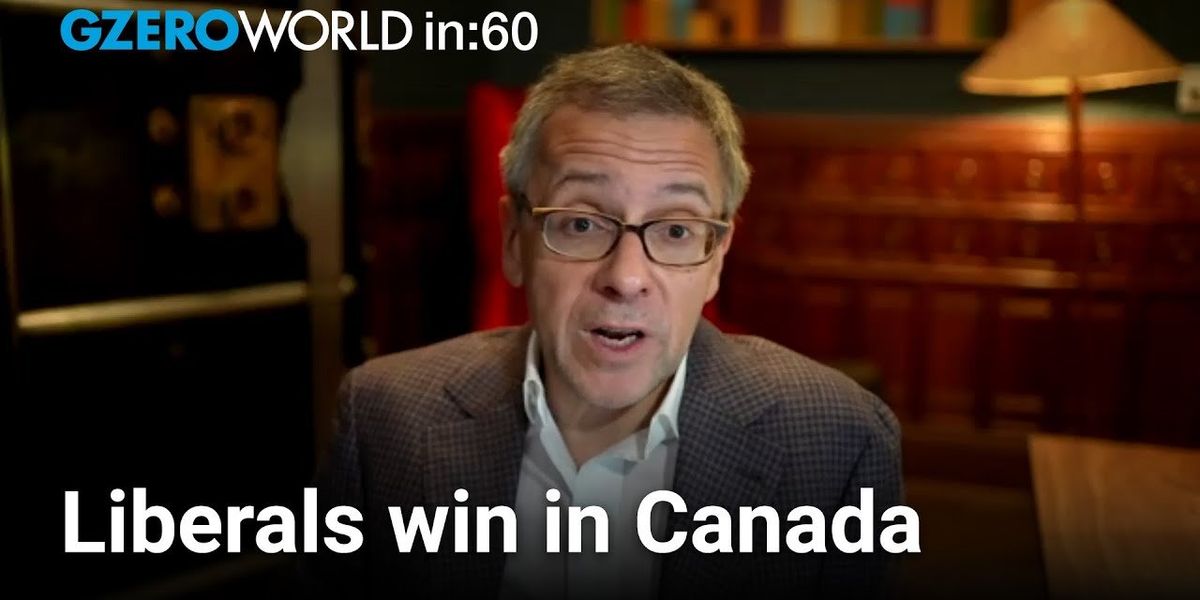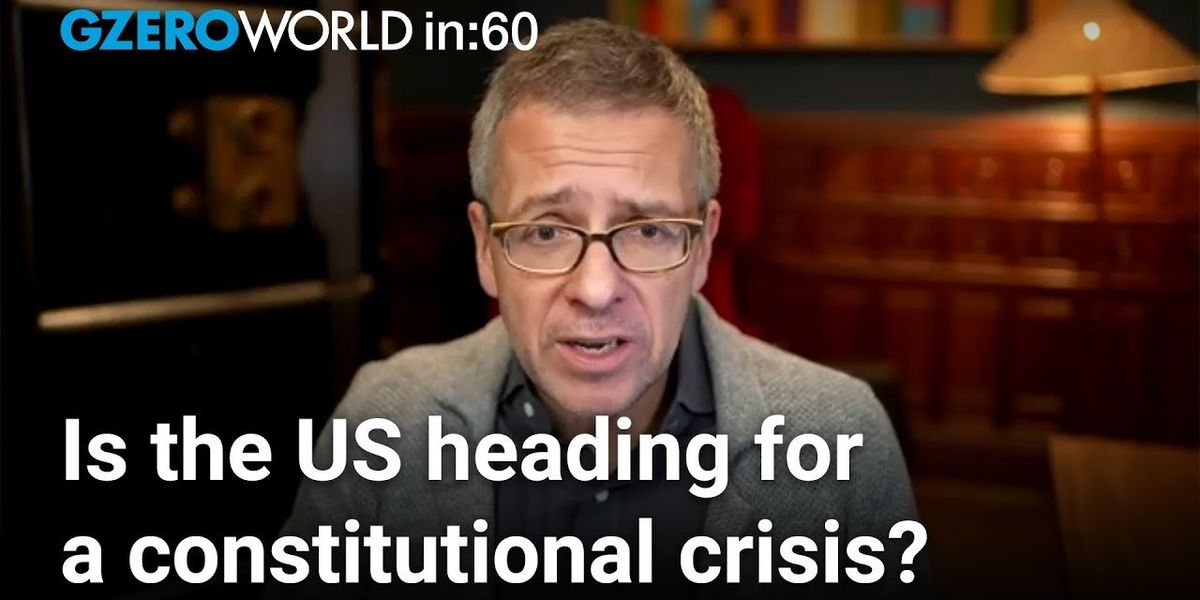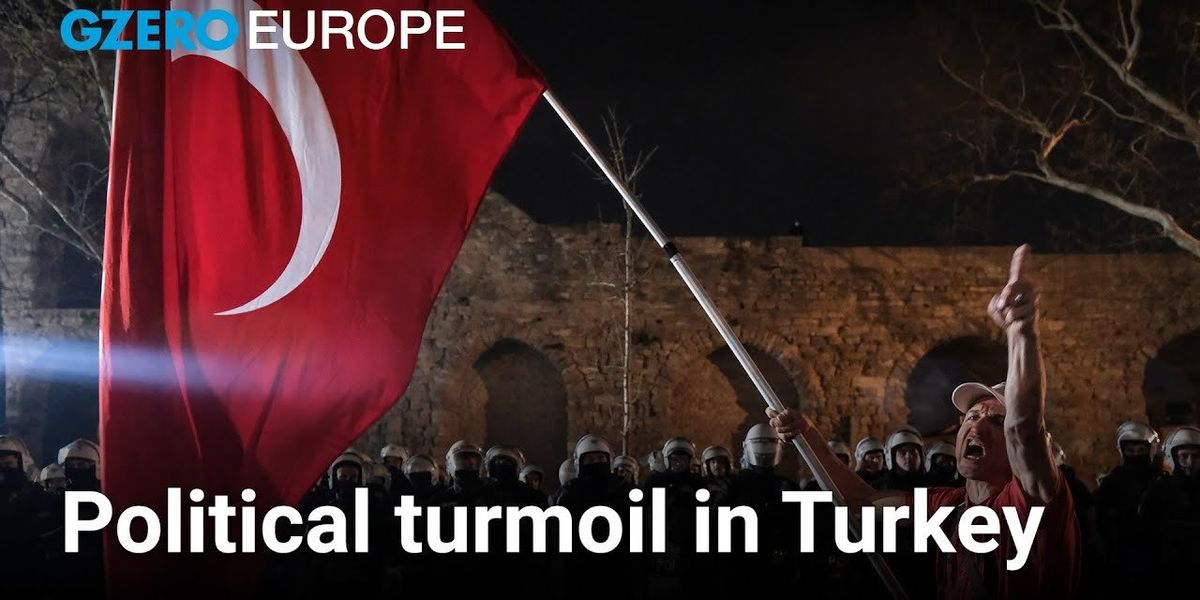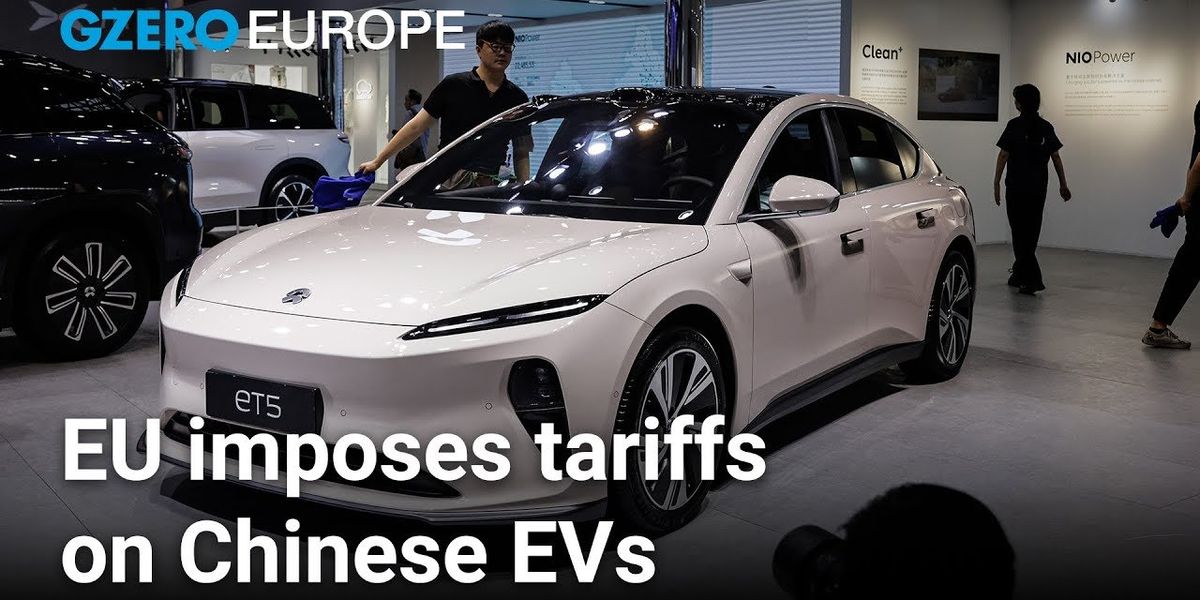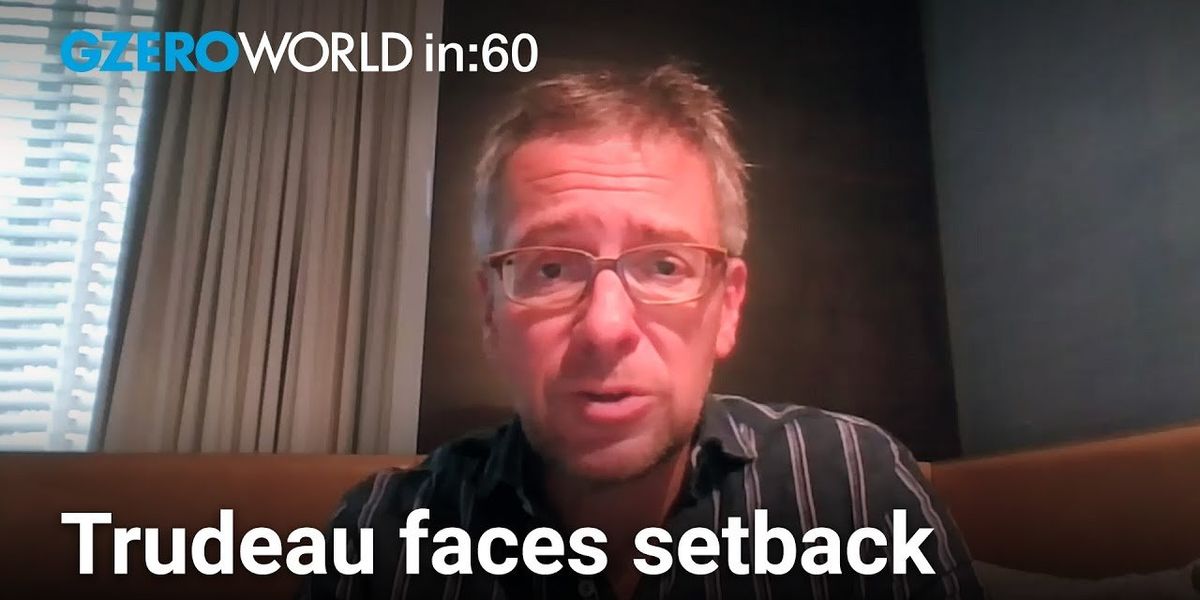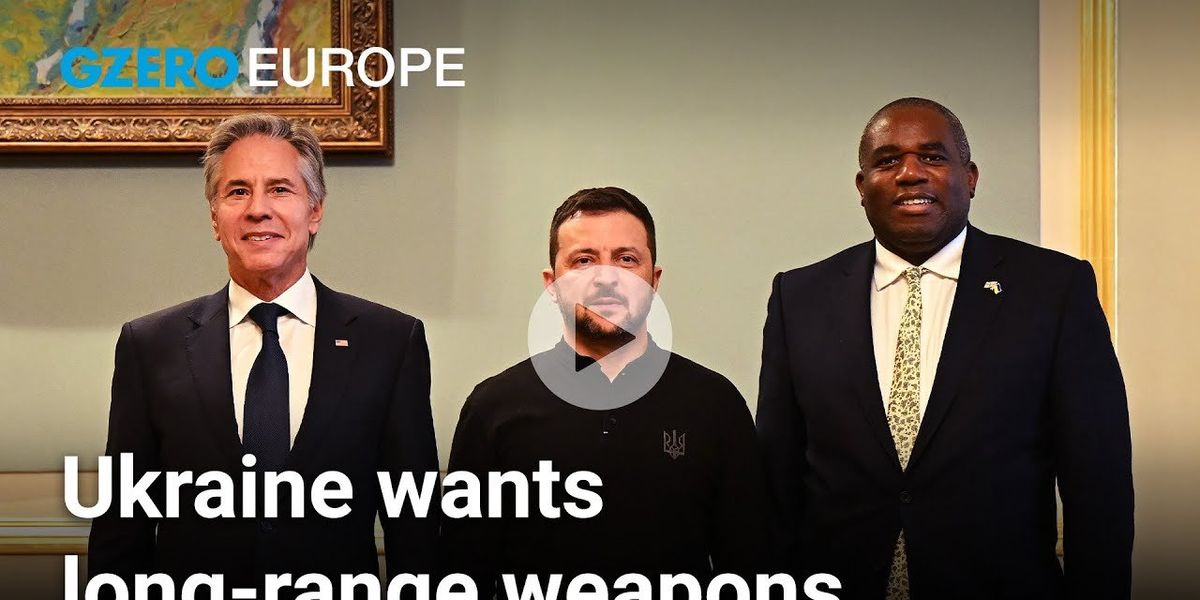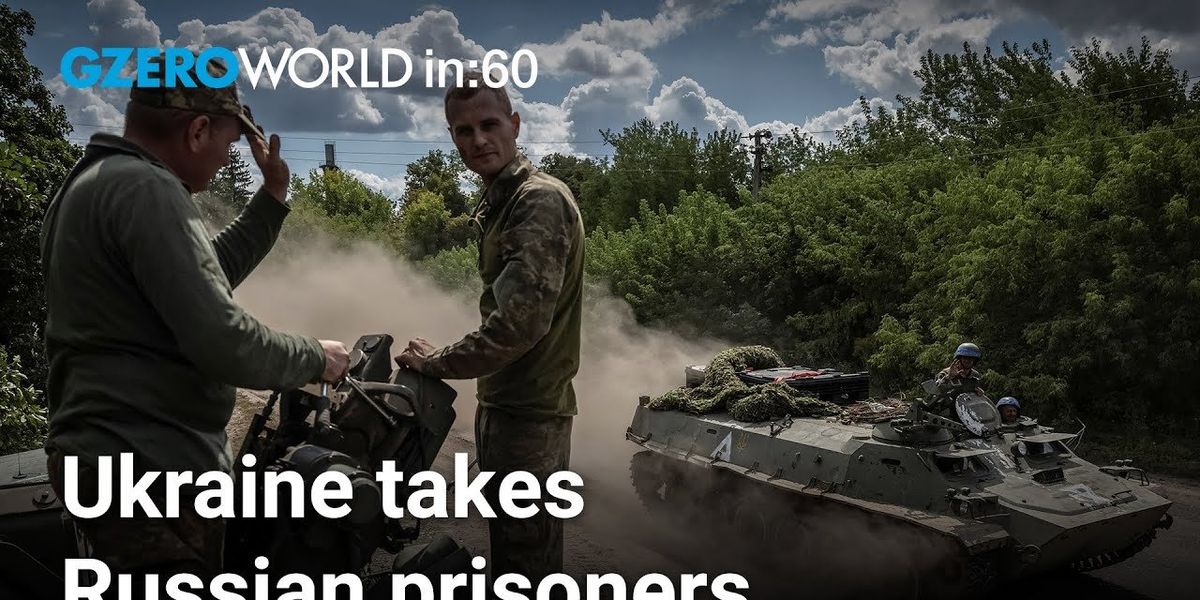Trending Now
We have updated our Privacy Policy and Terms of Use for Eurasia Group and its affiliates, including GZERO Media, to clarify the types of data we collect, how we collect it, how we use data and with whom we share data. By using our website you consent to our Terms and Conditions and Privacy Policy, including the transfer of your personal data to the United States from your country of residence, and our use of cookies described in our Cookie Policy.
{{ subpage.title }}
Will Iran’s regime survive?
What’s next for Iran’s regime? Ian Bremmer says, “It’s much more likely that the supreme leader ends up out, but the military… continues to run the country.” Despite global speculation, real change will depend on the Iranian people, not foreign intervention, says Ian.
As attention shifts to the Middle East, Ukraine faces intensified Russian strikes with less international spotlight. Still, Ian notes NATO support remains “pretty solid,” and the upcoming NATO summit in The Hague will be a key signal of that.
And as China pushes for a multipolar currency system, Ian is skeptical: “It’s not premature to talk about multipolarity economically—it is in terms of a currency order.”
Why Mark Carney’s victory won’t heal the US-Canada rift
Ian Bremmer shares his insights on global politics this week on World In :60.
Mark Carney leads the Liberals to victory in Canada. So, what's next for the US-Canada relationship?
I think sometimes you have relationship with somebody, and they do something that shocks you, you can't unsee it, I think US-Canada is like that now. I think the damage is permanent. Of course, the interdependence is immense. The dependence on the Canadian side is higher. They're a much smaller country. Their population is right next to the United States. Just a thin strip there. So, it's not like you can suddenly decouple, but there's going to be a lot of de-risking. So, strong efforts, very tough negotiations coming on trade and on security, but also an effort to build infrastructure and ship Canadian resources away from the United States, towards other countries around the world. Medium-term, that's going to be a pretty significant change in how we think about Canada.
The conclave will pick the next pope. How is it relevant for the wider geopolitical landscape?
It's relevant because, increasingly, political leaders do not inspire. So, here you have a population as large as any country, about 1.4 billion Catholics all over the world, just like India, just like China. That's the size of the global population. If the next pope that is picked is someone who is inspirational, is someone that is seen as a 21st century leader that can reflect sensibilities and ideology, values that are not seen from political leaders around the world, in your own countries, then the ability to have an impact on what gets young people out, and motivated, and inspired and engaged in public service or on the streets, and mobilized, and demonstrating becomes significant. So, I do think there's a real opportunity here, but we'll see what it means when we finally see white smoke coming out of the Vatican.
Trump’s inaction on wrongful deportation may spark constitutional crisis
Ian Bremmer shares his insights on global politics this week on World In :60.
If the US won't work to return a wrongly deported man to El Salvador despite a Supreme Court ruling, are we headed towards a constitutional crisis?
It certainly appears that way, and I think this is the constitutional crisis that the Trump administration would love to have. Because wrongfully deporting someone without evidence who is in the country illegally and therefore guilty of a misdemeanor, but sending them to a max security prison, which the Supreme Court says you shouldn't do, but now is in another country. Very few Americans are sympathetic to the case of this person. And indeed, Trump won on the basis in part of being sick and tired of allowing illegal immigrants to spend enormous amounts of time in the United States without recourse.
So he's breaking the law here. He's flouting independent judiciary and their decision-making, but he's doing it on an issue that most Americans have no sympathy on the other side. So the Democrats would have to be very wary of making this a hill they want to die on, and Trump knows exactly what he's doing. It is pretty impressive playbook for undermining rule of law and checks and balances on an increasingly authoritarian leaning executive. That's where we are.
Trump claims China-Vietnam talks are intended to "screw" the US. Does this run the risk of pushing Vietnam to China?
Certainly, most Vietnamese now are more well-disposed towards China than the US. First time we've seen that since the war. It's not true across Southeast Asia. Philippines, about 80% still pro-US, not pro-China. But it is a problem, and Xi Jinping understands that. And that's why he went in and was received directly by the president as opposed to the prime minister last time who met him at the airport. 45 big deals that they're signing on trying to improve economic coordination. Clearly a bit of a surprise to Trump, just as the direct retaliation from the Chinese, even though the Americans warned them, "Negotiate, don't retaliate." But that's exactly what China did, and Trump frankly should have expected that was coming. Now he looks a little bit weaker in the way he's backing down and creating exemptions for a lot of people in this space.
Saudi Arabia plans to pay off Syria's World Bank debt. Could this be a major turning point for Syria's future and its ties with regional allies?
It certainly helps. We've also seen the Qataris already say they're going to offer gas through Jordan into Syria. I think that this is all promising. The Saudis were never going to do that, provide any support as long as Assad was in place. Now they are. The Americans are pulling troops out, and Turkey is going to be the most important country on the ground. But economically, it's going to be the Gulf States, and that gives this new Syrian regime a better chance to succeed. Something we all clearly are rooting for in terms of one of the places that we'd like to see a little more stability from. Anyway, that's it for me, and I'll talk to you all real soon.
- Zelensky snubs China’s peace push, Trump vows to end war “very quickly” ›
- China’s vows to pump up its economy — with one eye on Trump’s tariffs ›
- El Salvador's president wins big. What does this mean for the country and its neighbors? ›
- El Salvador's Bukele refuses to return wrongly-deported Maryland man, and offers to jail US citizens too ›
Turkey's protests & crackdowns complicate EU relations
Carl Bildt, former prime minister of Sweden and co-chair of the European Council on Foreign Relations, shares his perspective on European politics from Stockholm, Sweden.
Do you think the Signal controversy in the US will have an impact on the transatlantic relationship?
Well, not in itself. It does betray an attitude to security issues that is somewhat too relaxed, to put it very mildly. But what does betray as well is the disdain, the resentment, the anger against Europeans that is there from the vice president, the secretary of defense, and others, and that is duly noted. And of course, something that is subject of what we have to note it. It's there. It's a fact.
What impact do you think the Turkish protest and instability will have on Turkish relationships with its European allies?
Well, it's certainly not going to be a good thing. We have an interest in good relationship and stable relationship with Turkey. It's a significant EU strategic actor. It's a significant economy. But of course, when we have these arrests of a prominent opposition, politicians, we have massive protests that are repressed, that we have massive violations of social media and arrests of journalists and things like that. It does complicate things to put it very mildly. We haven't seen the end of that story yet.
Is an EU-China trade war brewing?
Carl Bildt, former prime minister of Sweden and co-chair of the European Council on Foreign Relations, shares his perspective on European politics from Vienna, Austria
Is there a risk of a full-scale trade war between the European Union and China?
Hopefully not. But it was a decision, somewhat controversial, the other day by the EU to impose tariffs, not too high but still substantial, on electric vehicles coming from China. The US, of course, has done something similar but much higher tariffs and without much of a theoretical justification. I mean, the EU tried to ground its different decisions in analysis of the subsidies generated or given to the different Chinese car manufacturers. China will retaliate in one way or the other. But talks are going on and there's no interest in a trade war either from the EU side or from the Chinese side. And we should not forget, by the way, that for the moment, there are 100 times more cars sold by European companies in China than Chinese vehicles or cars exported to Europe.
Why is the deal between Italy and Albania on refugee centers so controversial?
Well it's been criticized by human rights groups, whether that is justified or not, it's difficult for me to judge. But the idea is for roughly 3,000 asylum seekers to Italy to be roughly 3,000 of them every month to be processed in two centers in Italy that are going to be run by and financed by Italy. We'll see how this would work out. They would be coming from primarily what they call "safe countries," and that means that the expectation is, of course, that the majority of them, or the vast majority of them, will have to be repatriated to their respective countries. It's part of the effort by X numbers of European governments to deal with the migration issue that is in very many of the countries the number one domestic policy concern at the moment.
- Europe plays the blame game over asylum-seekers ›
- Migration makes strange bedfellows of Germany and Italy ›
- Does the EU really have a foreign policy? ›
- “Super Mario” wants to level up Europe against China ›
- EU-China "reset" in limbo ›
- AI can reduce trade costs, says WTO's Ngozi Okonojo-Iweala - GZERO Media ›
- Three big shocks facing the global economy | Zanny Minton Beddoes | GZERO World with Ian Bremmer - GZERO Media ›
Why Canadians are tired of Justin Trudeau
Ian Bremmer shares his insights on global politics this week on World In :60.
Why is Mexico's judiciary overhaul controversial?
Main reason is it means the judiciary is going to be less independent and much more politicized. They're going to be elected, these judges. They're going to have shorter terms. They're going to be aligned with whoever happens to be in political power. That is the intention. That's why AMLO, outgoing president, wanted this judiciary reform to get done and not be changed. But not only does that undermine rule of law and means that his preferences, his party's preferences will likely also be that of the judiciary. But also, especially in a country where there are very, very strong gangs associated with drugs, any place where they have strong governance, they'll be able to also ensure that the judges are the ones that they want, and that is a horrible development for rule of law in a country whose democratic institutions frankly aren't very consolidated. So, it's a problem and it's going to hurt the Mexican economy, hurt the investment climate.
After losing another parliamentary seat, is Justin Trudeau's time as Canada's leader coming to an end?
Certainly. Sometimes you stay a little longer than your performance merits. This is certainly the case for Trudeau. The people are tired of him. They don't feel the country's heading in the right direction. Major problems in terms of inflation, especially real estate, housing costs, lack of availability of housing, and just people wanting something different. We've seen that all over the world with elections over the last year. We're going to see it in Canada in the coming months.
2.5 years in, and 1 million now dead or injured. Is Russia's invasion of Ukraine any closer to resolution?
I'd say it's closer to resolution insofar as the Ukrainians increasingly know that it's getting harder for them to field troops, to fight, to defend their territory. That's why the risk, the risky attack inside Russian territory, which they probably can't hold, but certainly has meant that they're going to lose more territory in Ukraine. Also, certainly you talk to NATO leaders, they understand that the time for negotiations, the time for trying to wrap up the war and freeze the conflict, a ceasefire, at least, if not a negotiated settlement is soon. So, I'd be surprised if the war is still going with the level of intensity in a year as it is right now, but the Ukrainians are not going to get their land back. And what that means and what kind of guarantees they get from the West, including security guarantees potentially, certainly Ukraine very hopeful for an actual formal NATO invitation, which they don't have at this point. That is the state of negotiations happening between the Ukrainians and others.
Ukraine frustrated by delay on long-range weapons
Carl Bildt, former prime minister of Sweden and co-chair of the European Council on Foreign Relations, shares his perspective on European politics from Kyiv, Ukraine.
What's the reaction on the discussions ongoing considering the possibility of Ukrainians to use long-range strike weapons?
Well, a lot of dissatisfaction here in Kyiv. There was the visit by Secretary Blinken and Foreign Secretary Lammy here. There were discussions between President Biden and Prime Minister Starmer in Washington, but no decision. And the Ukrainians really want to be able to strike back at the air bases from which the Russians are launching attacks, trying to completely demolish the Ukrainian energy system. I understand discussions will continue and it will have an impact on the mood here and possibly the conduct of the war.
What's the reaction to Germany's decision to partly at least reimpose on their border controls?
The reaction has been rather negative to put it mildly, as an understanding for the domestic political circumstances leading to the decision by the German government. But here's to take one example, Polish Prime Minister Tusk was scheduled to go to Berlin on a working visit. He canceled that in order to make it clear to the Germans that reimposing controls on the German-Polish border he considered to be contrary to the spirit of cooperation. So expect more on that particular story.
Ukraine's capture of POWs undermines Russia's narrative
Carl Bildt, former prime minister of Sweden and co-chair of the European Council on Foreign Relations, shares his perspective on European politics from the Adriatic Sea.
How might Ukraine's capture of Russian prisoners of war affect the narrative of the war?
I don't think it's going to have any immediate effect on the narrative of the war. The big shift in the narrative is, of course, that while the Russian Putin has been saying that Ukraine is about to lose this particular war week by week, day by day, village by village, that's been turned around and very much the outcome of the war is now more open, where Ukraine has demonstrated a substantial offensive capability as well. That's the change.
How do the lithium protests in Serbia reflect the wider tensions in the country?
Well, they certainly do. I mean, first it has to be said with large-scale mining project, there are always environmental concerns and there have been other mining projects in Serbia, Chinese with the Bor copper mine, where that has not been the case. So there are concerns. That being said, the protests are also fueled by the fact that there is substantial democracy and transparency deficit in Serbia. So under other circumstances, this would've been a more normal environmental concern protest. Now it's a much wider issue, reflecting tensions in Serbia's society.

